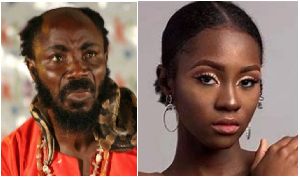Following the disturbing remarks made by Kumawood actor Big Akwes during a live TV discussion, where he graphically described how he would kill Cina Soul during a “Kiss, Marry, Kill” segment, criminal lawyer Bernard Obiri has outlined the legal options available to the musician.
Big Akwes on Bryt TV claimed he would summon Cina Soul spiritually, stab her, drink her blood, and eat her intestines.
Although framed as part of a game, the graphic nature of his comments sparked massive public outrage.
Cina Soul later shared the video on social media, tagging the Ghana Police Service and the Ministry of Communications.
She described the remarks as “deeply unsettling” and said, “I feel genuinely threatened.”
Speaking on the development in an exclusive interview with GhanaWeb’s Isaac Dadzie, criminal lawyer Bernard Obiri explained that pursuing criminal charges would require the police to establish that a credible threat had been made.
“She would first need to file a formal complaint with the police, stating that she feels her life is at risk because of the remarks made,” Obiri said.
He noted that for a criminal case to proceed, investigators must determine if:
1. A threat was actually made
2.Whether the person intended to carry out the threat
3. Whether the person had the means or capacity to carry it out.
However, Obiri acknowledged that the context of the statement, a game, could make it difficult to prove an ill motive.
“Because it was part of a game, he could argue that the comments weren’t serious,” he explained.
Even though Big Akwes has previously been accused of verbally harassing Cina Soul, such as body-shaming her on live television, Obiri said that building a criminal case would still be challenging.
Furthermore, the fact that the supposed threat involved “spiritual” methods, such as summoning her through a magic mirror, adds another legal complication.
“The law does not concern itself with spiritual matters. You cannot prove such things in court,” he added, referencing the case Blay v. The Republic.
Nevertheless, Obiri emphasised that her strongest recourse lies in civil legal action.
He highlighted that Ghana’s Domestic Violence Act (Act 732 of 2007) allows victims to apply for civil protection orders, which can prohibit the respondent from committing or threatening any form of violence or harassment.
These orders, according to him, can be imposed temporarily, ex parte, for up to three months and extendable up to twelve months, during which Big Akwes could be legally restrained from further threats.
He said if the actor violates the order, he may face fines or imprisonment.
Additionally, he said they may include provision for temporary occupation orders, compelling a respondent to vacate shared or specified premises, further safeguarding the applicant.
“So she can issue a writ against him in court. Probably for a nuisance. She may seek an order from the court against him to retract his statements and to probably refrain from committing the acts she is complaining about,” he said.
To strengthen her case, Obiri urged Cina Soul to preserve all relevant evidence, recorded video clips of the game segment, social media posts, news coverage, and any previous televised incidents. to support applications both to the police and the civil courts.
In conclusion, while criminal proceedings may falter given the entertainment context of the remarks, civil remedies offer robust protection.
Filing for a civil protection order could afford immediate relief and legal consequences for non-compliance, sending a firm message that such violent rhetoric cannot go unchecked, even on television.
ID/EB
You can also watch an exclusive interview with Ayisi on the latest edition of Talkertainment below:



